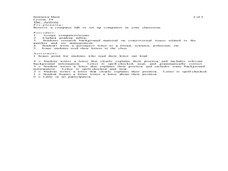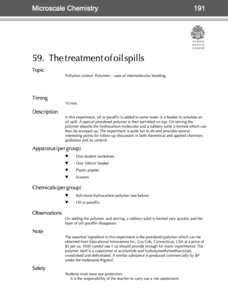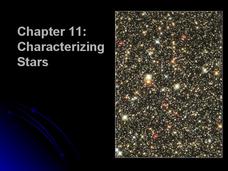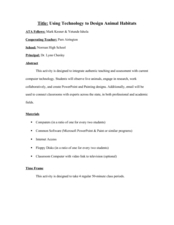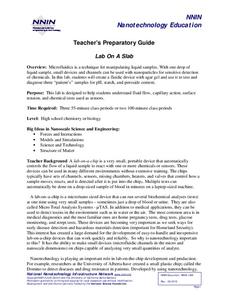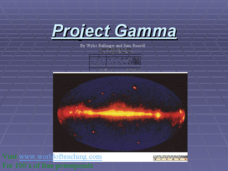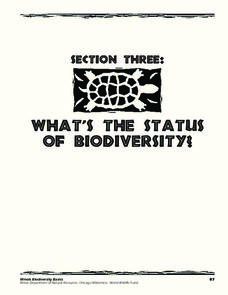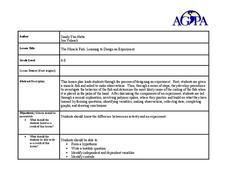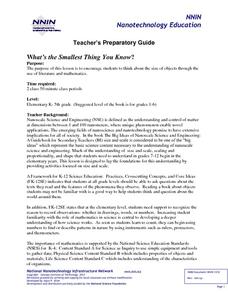Curated OER
Using Environmental Models to Determine the Effect of Acid Rain on an Ecosystem
Demonstrate to your middle school science learners how chalk breaks down in a weak acid. Discuss what affects acidic rain might have on ecosystems. Lab groups then choose one of two questions: "How does acid precipitation affect an...
Curated OER
Barometer and Boiling Points
Diagrams bring barometers to light in this PowerPoint. Several slides explain the structure and function of this apparatus. The relationship of air pressure to the processes of evaporation and boiling are also explained. This would be an...
Curated OER
Velocity of Traffic on Highway 26
Physics fanatics time five cars as they pass on the highway. They use the times and a 20-yard distance to calculate velocity. They also graph distance vs. time. A page of student pre-lab questions is provided in addition to the activity...
Curated OER
My View's Write!
After researching issues involving panthers, middle schoolers practice writing persuasive letters. They become familiar with a controversial issue related to panthers and write their position on the issue. This lesson...
Royal Society of Chemistry
The Treatment of Oil Spills—Microscale Chemistry
When oil spills happen, how is the oil cleaned up? Pupils of polymer science discover an amazing substance that turns oil into a solid during a microscale experiment. Individuals observe oil or paraffin before and after addition of the...
Science Geek
Properties of Acids and Bases
It's all about that base! Teach the properties of acids and bases using the sixth slide show presentation in a series of seven. The lesson discusses acid and base properties and reactions. Pupils also see the effect on indicators when...
Glynn County School System
Characterizing Stars
Are brighter stars actually brighter? Turns out they are probably just closer! A presentation compares features of stars to our favorite star, the sun. In addition, solar lovers learn to classify stars based on their masses,...
University of Southern California
What Lives In The Ocean?
One of the most diverse environments on Earth is the ocean. Young scientists explore the living things found in the ocean during an exciting seven-lesson unit. Their study includes organisms from plankton to invertebrates...
Curated OER
Review of Vectors
In this physics worksheet, learners complete 50 multiple choice questions on vector addition. They calculate displacement and resultant vectors.
Curated OER
Using Technology to Design Animal Habitats
Students study the relationship between an animal and where it lives. In this habitats lesson students research to obtain data and create a professional report.
National Nanotechnology Infrastructure Network
Lab On A Slab
Capillary action is the frugal chemist's dream ... the less liquid used, the more tests they can run! Learners experiment with the best design to maximize the benefits of capillary action. Using a liquid sample, they design a capillary...
Curated OER
Project Gamma
These slides give sets of facts and trivia about gamma rays. Your physicists will learn the dynamics of scattering photons and energy involved in gamma ray bursters. The concepts are quite involved making this PowerPoint a nice addition...
Illinois Department of Natural Resources
Section Three: What's the Status of Biodiversity?
Biodiversity is essential for every habitat, but many species are at risk due to pollution and other factors. Explore several different species native to Illinois in a gallery walk with posters that learners have created after research...
Curated OER
Practice Sheet: Colligative Properties
In this colligative properties worksheet, students solve eight problems. They calculate molarity, molality and grams of substances in addition to using colligative properties to calculate solutions.
Curated OER
Mighty Oaks from Little Acorns
What does it mean to grow? To germinate? For the plan detailed here, class members investigate the growth process of an oak tree while focusing on the beginning stages of planting and germination. They plant seeds and record observations...
Curated OER
The Miracle Fish: Learning to Design an Experiment
Students develop procedures to explore the behavior of fish. For this scientific experiment lesson students from a hypothesis, write a question, identify different variables and controls in their experiment.
DiscoverE
Build a Pinball Game
Watch your classroom turn into an arcade. Pupils work in groups to build pinball machines from boxes and other found objects. Gamers must incorporate a variety of obstacles and launchers into the machine to see their designs in motion.
Curated OER
The Greenhouse Effect
Why does it get so hot inside of our cars in the summertime? The greenhouse effect! Lab groups experiment to see what happens to an ice cube enclosed in a jar and placed in sunlight as compared to an ice cube outside of the jar. They...
Curated OER
WS 2.5 Dimensional Analysis
Science students apply dimensional analysis to relate quantities in six different problems. They consider the cost of steak, a young man's growth rate, a medicine prescription, fuel efficiency, and more. This instructional activity is a...
Curated OER
Particle Model of Solids, Liquids, and Gases
Display the arrangement of molecules in solids, liquids, and gases. Demonstrate how the addition of heat energy results in greater molecular motion and therefore a change of phase. Give examples of heat conductors and insulators, and...
Curated OER
Chemistry 231, Exam 3
This exam is aimed at assessing college level organic chemists. Ten problems are to be solved and include drawing molecular structures, assessing degrees of saturation, ordering alkenes according to stability, and explaining chemical...
Curated OER
Tracking the Salt Front
Using the Hudson River as the focus, learners discuss the difference between salt water and fresh water environments, analyze maps and graphs, and complete addition and subtraction problems. This lesson comes with a wealth of...
National Nanotechnology Infrastructure Network
What’s the Smallest Thing You Know?
Elementary learners listen to a story, then sort objects from largest to smallest at six different stations around the classroom. Adaptable for a large range of age and ability groups.
Curated OER
Matter
Young scholars complete a unit of activities to learn about states of matter and how to measure matter. In this matter lesson, students complete 8 lessons to learn about matter, its states, and how to measure matter.



